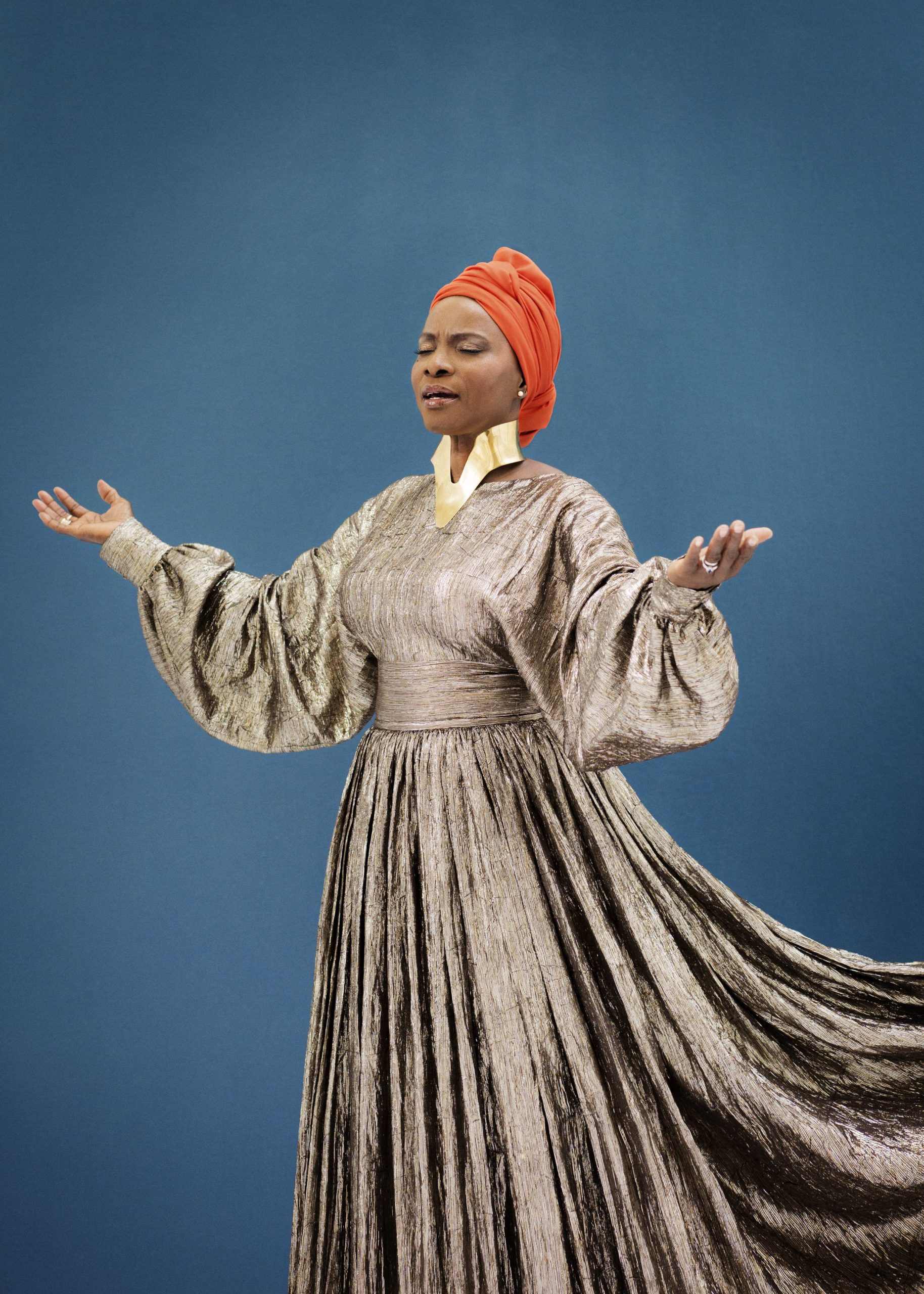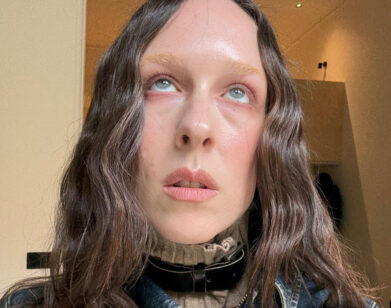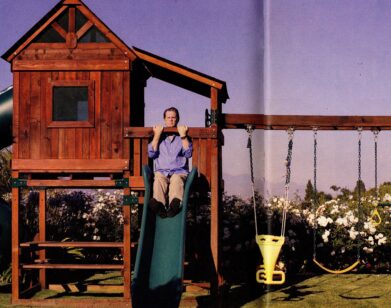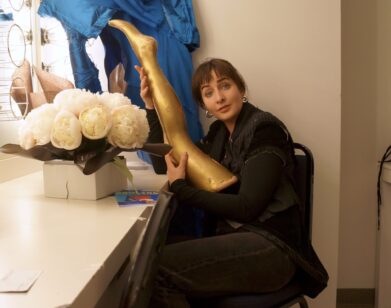Music!
Angelique Kidjo and David Byrne See a Change Coming
Beninese diva-superstar Angelique Kidjo and David Byrne had known each other for many years before they ever thought about working together. In 2018, Kidjo released Remain in Light, a track-by-track reimagination of the seminal record by the Talking Heads, of which Byrne was the large-suited frontman. And amidst a lockdown landscape, both have stayed hard at work, with Kidjo—who is nominated for three Grammys this year, including Best Global Music Album and Best Global Music Performance—starring in Yemanja, a music theater performance that she created with her daughter, and Byrne starring in American Utopia, the Broadway adaptation of his tenth studio album. The two remain close, though in light of the pandemic, they haven’t had an extended chance to chat until now. In order to reconnect, they hopped on the phone to discuss African musical entrepreneurship, generational shifts in young artists’ agency, and what’s to come for Afrobeats at large. —HENRY SCHWARTZ
———
DAVID BYRNE: How are you?
ANGELIQUE KIDJO: I’m good. How are you?
BYRNE: I’m very good.
KIDJO: I’ve seen American Utopia everywhere, everybody’s been talking about it. I’m like, “I’ve seen it, and I’ve been on stage too!”
BYRNE: We’re still going.
KIDJO: It’s a beautiful show. If you stop, something is wrong.
BYRNE: Well, I’ve been doing it for a long time now.
KIDJO: But you love doing it, right?
BYRNE: I love doing it. It feels good, the band is great, the audience reaction has been great. It feels like we’re speaking to things that people are feeling.
KIDJO: That’s the impression that I got from people, because they were like, “Man, we were not expecting that. It feels timely.”
BYRNE: Speaking of timely, I want to ask about your record, because you’ve been working with some African artists.
KIDJO: Yeah.
BYRNE: In the past, you’ve worked with Cuban artists, and you did the tribute to Celia and Brazilian artists. I thought, “Oh, now you’re going back to Africa!” It’s different than it was before.
KIDJO: Yeah, it has changed.
BYRNE: It’s changed, and there’s a lot of new artists coming up.
KIDJO: They have different visions about everything, too.
BYRNE: Tell me about that.
KIDJO: As an African artist, it’s interesting to see fiercely independent [artists]. When I started, I needed a record company to have a career. Today, they want to put their music out independently, because the internet allows them to be instantly everywhere. It’s interesting to hear them say, “We own our stuff.” They are entrepreneurs and they are claiming this space.
BYRNE: Exactly. You might think, “Maybe something like that might happen in the United States.”
KIDJO: But not in Africa.
BYRNE: It’s happening in Africa! Entrepreneurs there decided to start these streaming services that were open to all artists. They could own their material—they had no record company or anyone telling them how to do it—and get it streaming to a huge audience.
KIDJO: Yep. I just came back from South Africa, and there’s a young DJ called Shimza. Out of the blue, he decided to rework my song, “Agolo,” and he just blew up.
BYRNE: [Laughs]
KIDJO: I’m like, “What is going on?” We met and he said to me, “I grew up with that song, and it’s everywhere because it coincides with the liberation of Nelson Mandela.” In South Africa, that song has a totally different meaning. When he put chords in there, I’m like, “This is kind of clashing, man. This is not going to work.” He said, “Trust me, it’s going to work.”
BYRNE: [Laughs] He was right.
KIDJO: They still think that I’m relevant today, even though we’re getting old.
BYRNE: I know what you mean.
KIDJO: I still feel that we count, that our music has brought something to them, that they want to experience more and transform it in their own vision.
BYRNE: Although I complain about how little we get paid from streaming, one of the positive things is that age doesn’t make that much of a difference. You find young people who are listening to our stuff and they’re also listening to contemporary artists.
KIDJO: That’s it! It’s a completely different era. I made my last album during the first lockdown. In October 2020, there was this movement called End SARS in Lagos against police brutality. I reached out to Yemi Alade, and she said, “They’re shooting at us!” I’m like, “Get out of the street, please. Go back to the studio, the only weapon we have is music.” She was so stressed and afraid. I said, “Everything you’re feeling right now, just give birth to it. ” She came up with the phrase, “We come in peace, not in pieces.”
BYRNE: Mm-hmm.
KIDJO: Respect is reciprocal. That’s how the song gets there. I’m realizing this generation doesn’t want to accept excuses from anybody when they do wrong. They want a different society, and they are singing about it, and they are touching more people than any politician in Africa has ever been able to. My fear is that at one point they might want to stop them. Because people are waking up, and they’re like, “It’s not normal that we live the miserable life that we live. We work day in and day out. We are not sitting down and not waiting for any handouts. Something has to change.”
BYRNE: More young artists are getting involved in politics, I think.
KIDJO: Corruption is everywhere. It’s going to take time before we start seeing young leaders in Africa. But it’s going to come.
BYRNE: I hope that happens, and they can avoid all the corruption.
KIDJO: You are the first one who made me realize that corruption was a punch. That’s what “Born Under Punches” means to me. When you’re talking about government men, I thought, “Oh hell no, this is exactly what I’m talking about.” Corruption destroys our life. The money that can be invested in education, health, infrastructure, is siphoned by people that have no clue. It has to stop.
BYRNE: I agree. Maybe this younger generation will begin to affect some change. A lot of the contemporary African artists are very electronic. Is that because now, you can make music on a laptop? When we were both coming up, you had to have a whole band, which I still do.
KIDJO: Me too! But those kids don’t want that.
BYRNE: Those kids will just work on their laptops and make amazing tracks.
KIDJO: And, when they send me the stems, it’s spotless!
BYRNE: Of course.
KIDJO: They always have the signature of the producer. Most of the time, the producer’s name was written on the back of a CD or an LP. Now, when you listen to a song, at the end or at the beginning, you hear “It’s Kel-P Vibes.”
BYRNE: Ahh. So you know who made the song.
KIDJO: Exactly. This song exists because I’m here—that’s a new attitude. Why should the producer not be seen in an album they produced? You have to be there with the music, which is also completely changing the vision that we have about producing. The producers now in Africa, the sounds that they make are part of the song.
BYRNE: That’s true. Our generation thought of the song as being the beats and the melody and the words. But now it’s the sound.
KIDJO: It’s the sound. If they want something, boom, they find it. The ability of these young kids always amazes me. Some of them don’t even have big studios. My song with Burna Boy—I don’t know what he put on my voice. He took a screenshot of the machine that he used and sent it to me. I said, “Thank you for sending me that, but I don’t understand anything about this machine business.” They create all these new ways of making music to express themselves, it’s just like an affirmation of “We are here to stay.” Any new music from you?
BYRNE: Not yet. To be honest, during the deep part of the pandemic, I was not able to write. I did a lot of drawings every day. But writing songs—I couldn’t do it. I started writing about a month ago and it’s coming out again. But in the middle of it, I didn’t know how to react.
KIDJO: If I didn’t have music, I’d have collapsed. In the first three months, the only place I would go was the studio. I would just sit there and make music. That’s what kept me sane. I started gardening, because I like veggies, and you couldn’t find veggies because everybody would order food online. You like studios. I hate them. I have to be on stage. For the first time, I found comfort in the studio. I found comfort in the fact that I could sit there and have something to offer to the world. That’s how I could actually get my mental health in check.
BYRNE: Did you learn to cook things that you hadn’t cooked before?
KIDJO: Well, I started baking bread again.
BYRNE: [Laughs] I did not do that. I learned some other things.
KIDJO: I’m married to a French guy. He eats bread with everything. He eats bread with rice, couscous, pasta—whatever you put on the table. If there’s no bread, he ain’t eating it, so I gotta bake!
BYRNE: That’s right.
KIDJO: There was nothing you could do. We couldn’t take a walk anywhere. I thought, “What can we eat that won’t put our health in danger?” I started using more and more nutmeg, cinnamon, turmeric, and all those things. I’ve become a guru of looking at what’s going to go in my belly. I had to read everything about it because I didn’t want to be sick. Did you cook during lockdown?
BYRNE: Yes. I learned some Mexican dishes, because it’s easy to go and buy Mexican ingredients here. Indian food. My partner is Indian, so I would cook things for her and say, “How did I do?”
KIDJO: Then she goes, “Oh, it’s kind of Americanized. That’s not really what it is.” [Laughs] I have to teach you how to make some African dishes.
BYRNE: I know. I tried Brazilian dishes, like moqueca.
KIDJO: You know that moqueca [correcting pronunciation], all of those meals come from Benin.
BYRNE: Yes, of course.
KIDJO: Like vatapa, for example, is the name of the traditional baptism in my family. It’s the food that comes with the traditional baptism.
BYRNE: I didn’t know that. I knew it was all African.
KIDJO: The tradition of baptism, basically, is to find out which ancestors of which God accepts to be your guiding spirit during your lifetime on Earth. I have a project that I’m writing right now with my daughter, called “Yemanja,” about that, it tells the story of slavery through the gods. The premiere is going to be at Mass MoCA on March 4th.
BYRNE: Is this a theatrical production?
KIDJO: Yes, it’s a musical. I want you to see it. We are rehearsing in New York right now. If you have time, you can stop by.
BYRNE: I want to see it. Did your daughter grow up in the United States?
KIDJO: Yeah, we arrived here when she was four. But we’ve been going to Benin since she was three months old. She’ll go to the village, talk to my brother. She also had her traditional baptism there. I’m baptized but I don’t go to church. She came to your place when she was a kid, do you remember that? She was very little.
BYRNE: She was very little.
KIDJO: Now she’s twenty-eight, and she wrote this piece beautifully. In Africa, music is in everything. It’s like in Brazil—we celebrate, we play music. I wanted that to be intertwined with the play. Music is there from the beginning.
BYRNE: Can you explain the Orishas for readers?
KIDJO: The Orishas are living beings, chosen by a god. They live with us, and each has an identical Greek god. They are the elements: fire, thunder, water, iron. Religion was the first thing that our ancestors witnessed. Five minutes ago, the sun was up and suddenly you had thunder. You can’t understand it. It’s in the sky up there, so you praise the god in it. That’s how the Orishas were created. They are like the Catholic saints.
BYRNE: I would say that unlike the saints, the Orishas all have a part of nature that they are connected with—whether it’s rivers, oceans, air, fire. In Christianity, Judaism, Islam, there’s a separation from nature, a feeling that man has to have power over it. With the African religions, it’s about living together with nature and understanding that they are inside you and you are part of them.
KIDJO: That’s what my grandmother used to say: “You are not here just because of your mom and dad. You’re part of nature, you are made of water.” For me, there’s no guilt or judgment that comes with it. Religion is not there to take away your free will, or to tell you what to do. That was the threat from the Catholics when they arrived with slavery and colonialism—people were free. Their brains were not made to transform into guilt or possessing things.
BYRNE: Okay, so, back to the music. We can connect with music because a lot of these spiritual practices have music. It’s obvious to me that this is the wellspring of a lot of popular music. You can hear it in the Afro-Cuban music that was really popular decades ago.
KIDJO: Brazilian music.
BYRNE: Yeah. Now, some of the artists you’ve been working with are becoming popular here in North America. They have hits, collaborations with Drake and others. You and I have connected before, but on that level of popular artists connecting to a North American audience, it is a real breakthrough. I think it’s the sounds. They’re using these electronic sounds and audiences are used to that. It is familiar to them. They get it and go, “Oh yeah, I feel that.”
KIDJO: Electronic in Afrobeats has changed it too, because somebody like Burna Boy is not only Afrobeat—he puts dancehall in it. The Afrobeats are in the center, but everything else can get into it, and it creates a sound. There’s no boundary that they can’t break. That freedom is giving us different kinds of sounds. The creativity behind it is very well thought out.
BYRNE: Are you going to do performances based on your last record, or will you focus on Yemanja?
KIDJO: Yes, I have a couple of dates coming up. I have another project that I’m preparing with Ibrahim Maalouf, the trumpet player from Lebanon. When we decided to work together, I said, “What is the historical link between the Middle East and Africa?” I stumbled upon the Queen of Sheba, from Sudan. I went all the way to King Solomon’s wisdom with riddles. From that meeting, Menelik, the founder of Ethiopia, was warned. I picked seven riddles, and we wrote music about it. Also, one thing that is out right now is Philip Glass’ 12th Symphony. Philip Glass had written the third part of the trilogy with David Bowie in Berlin. He chose a couple of songs and we wrote the music for the symphony around it. He said, “I will do it only if Angelique Kidjo is the soloist.”
BYRNE: Wow. So you’re actually back to live performing?
KIDJO: Yeah. It’s weird to see people with masks.
BYRNE: Music is always there. We’re always around the corner to pick up people from the ground up. That is the beauty of what we do. Even people we don’t know, we may have an impact on their life. I’m like, “Okay! Let’s move on and continue doing it.”
BYRNE: In a way, that’s all we can do.
KIDJO: That’s it!
BYRNE: Well Angelique, that might be a good place to end, talking about what music can do in the world.
KIDJO: Let’s keep doing it. I’m happy you started writing music again, I can’t wait.
BYRNE: Me too.







